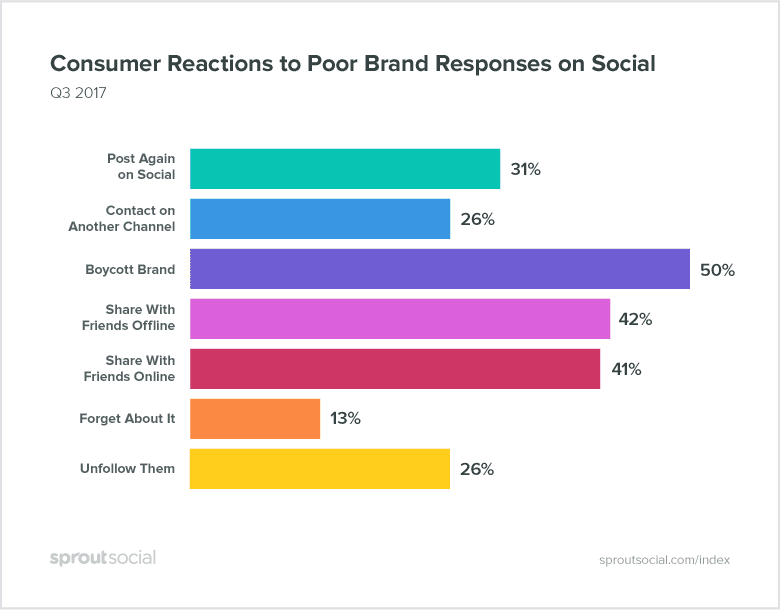
Seven Simple Strategies to Take Your Social Media Customer Support to the Next Level for Happier Customers
Social media consumes a lot of our waking hours, whether or not we intend it to (I mean, those memes aren’t going to chuckle at themselves). Especially in the COVID era, people seek connection and search for information on social media more than ever. In fact, people around the globe average more than 2 hours a day scanning social media.
Social media has changed how customers interact with companies. Customers expect to reach their favorite brands on social platforms. And, it’s become the preferred customer support channel for people under age 25. As younger generations gain consumer power, companies will want to prioritize social media customer support to meet the needs of their customer base.
[Read Next] How to prepare for the next generation of customers
To keep up with your customers’ needs and stay ahead of call center trends, take your customer service to social channels. Here are seven strategies to help you implement social media customer support in your contact center.
1. Find out which social platforms your customers are using…and go there.
It seems as if a new social channel pops up every few months. Maybe you’ve avoided entering the social media customer support sphere because it feels overwhelming.
But it isn’t necessary for every company to be present on every. single. platform. The key is to find out where your customers are most active.
[Read Next] What is good customer service?
Monitor the most common social platforms to see where your customers are talking about your company. Can you scan Twitter and see unanswered mentions of your brand? Or, do customers use Facebook Messenger to try to chat with a real person? Focus your energy on the few platforms your customers use.
Turns out, most customers will complain on the platforms they use the most. So, all you have to do is follow the customer trail, and you’ll be able to keep in touch with your customers and stay in-the-know on any issues or complaints.
2. Select and train agents to manage each channel.
When customers interact on social media channels, they expect real people to be on the other end. While chatbots have their place to help answer FAQs and point people in the right direction on your site, they don’t always translate well to social platforms. Customers go to social media to find a personal connection with their favorite brands. So it’s important to meet that expectation.
When training agents to handle social channels, there are a few avenues you can take. Option 1: select and train several agents to handle each social media channel you use. These agents should be friendly and knowledgeable in your company’s policies and goals. You don’t need every agent in your contact center to manage your accounts (in fact, that can open its own can of worms…see our point #3 below). Select several reliable agents who can represent your company well.
Or, option 2: Cross-train your entire team to handle every channel. While this might seem overwhelming, keep in mind that it has its advantages, too. If you only train a handful of agents to handle social media queues, then you and WFM managers add a layer of complexity to scheduling shifts, granting PTO requests, and accounting for the unexpected. What happens when one of your two agents trained to handle social media has to call in sick? Depending on your engagement, you overwhelm your remaining agent and risk missing SLAs.
Decide what method makes the most sense for your contact center and your business needs, then set up a queue for social media interactions, so questions from every platform get filtered to a central location. And, if your agents trained up on social media still need to juggle calls and emails, check in with them frequently to keep their queues and workload manageable.
[Read Next] Give your agents more purpose in their roles with these tips
3. Keep your voice consistent. Create guidelines to maintain your brand.
Your teams, executives, and marketing departments have worked hard to develop a brand and a voice for your company. One easy way to let that slide is to get sloppy with social media interactions. If too many agents or managers have the keys to the social accounts, your brand’s distinct voice will get diluted over time.
Work with your marketing team and leadership to come up with brand guidelines to maintain the company voice on social media. Social accounts should be fun and interactive. They can show company personality a little better than other mediums. But, it’s also important not to gloss over customer issues. If a customer sends out an angry tweet, responding with a cute pun will only further their frustrations. That’s why giving your team guidelines is so important. Once you’ve worked with marketing to develop brand guidelines, train your agents to maintain the company voice and friendly attitude.
Coach agents to use a voice that stays professional and unique to your company, but that’s helpful when your customers need it most. If that means only one or two people manage your pages, it’s worth it to maintain brand integrity.
4. Always respond – promptly.
Responding to every social media question, complaint, or comment shows your customers that you care about them personally. And when you respond publicly, you also signal to prospective customers that every interaction matters.
According to Statista, 47% of U.S. customers have a positive view of brands that respond to customer service questions on social media.
But in order for your responses to be effective, they need to be efficient, too. In a fast-paced world, customers expect fast responses on social platforms. Develop strict company standards for quick response times. And enable your agents to meet those standards.

If your company can’t afford to have 24/7 service, make your hours of availability clear. If a customer sends a DM at 2 a.m., send a friendly, automated message with a clear answer of when they can expect a response.
5. Stay a few steps ahead of your customers
It’s good to respond quickly to your customers’ questions and complaints. But it’s even better when you can get ahead of those questions and deliver proactive service.
If you keep an eye on your customers’ comments about your brand, you can spot trends to better help your customers. Get ahead of your customers’ questions and share FAQs, how-to videos, or step-by-step guides to explain important processes. Send a proactive email when your system’s down or your adjusting your service team’s hours. Use your reporting engine to learn and anticipate your customers’ needs, so you can solve problems before they surface.
If you think ahead of your customers, you’ll cut down on customer support calls. And you’ll impress your customers with how well you understand them.
Lush uses Instagram stories to explain company processes and answer FAQs in a fun and eye-catching way. Here’s one story they shared to answer a question they probably get a lot this year:

6. Think outside the box to reach your customers.
Social media customer support opens up tons of opportunities for creativity (for FREE!). It also connects you more closely with your customers. So, expand your idea of what service looks like.
Good customer service means providing reliable, knowledgeable, and friendly help to your customers in a way that values their time and meets–or exceeds–their expectations. Offering up that friendly, knowledgeable help on your customers’ favorite social platforms is just one more way to connect your customers to your brand.
So, don’t just hang out on Twitter to resolve customer complaints. Get creative about how to connect with and excite your customers proactively, too. Encourage agents to share or retweet fun customer stories with positive service outcomes. And, even work with your marketing team (again) to give out prizes or surprise customers with free items after you close an interaction (who doesn’t love free stuff?). Empower your agents to make decisions that benefit your customers (and your company) while showing off their individual personalities.

Customers are also curious about the inner workings of their favorite brands. So get personal and share info about your company on social media in ways you can’t otherwise. Coach your agents to introduce themselves when they help a customer (yes, there’s value in having agents sign off with their real names). Ask your marketing team to let your agents running social give a fun tour of your call center, or share a quick video introducing themselves. It humanizes the service experience. Customers want to feel like they know you. And when they do, they trust your brand and want to spread the word.
7. Take some public conversations to private messages.
Some customers may go to a public channel with a question that needs to go private. This could simply mean questions about a specific account or billing information. But it could also mean complaints from disgruntled customers that require a personal follow-up.
Prepare your agents to know how to handle these kinds of comments, especially if the customer is clearly angry. (Oh, and watch out for trolls, too. Turns out they don’t all live under a bridge. They’re free-roaming on the internet). Since most social platforms won’t let you remove negative comments, you want to maintain a positive company reputation and respond to even the angriest of mentions with poise.
[Read Next] How to handle angry customers
Have your team respond proactively with a DM, but also make sure you acknowledge their public post. This shows prospective customers that you see and respond to each comment, even negative ones.
Here’s a perfect example from Rocky Mountain Soap Company’s Instagram page:

Entering the world of social media customer support may seem daunting. But it’s all about showing your customers you care about them personally. If you hone your strategy and focus on meeting your customers’ needs, you’ll be in the social media game in no time.
[Read Next] Find out more practical steps to build a great customer service experience

